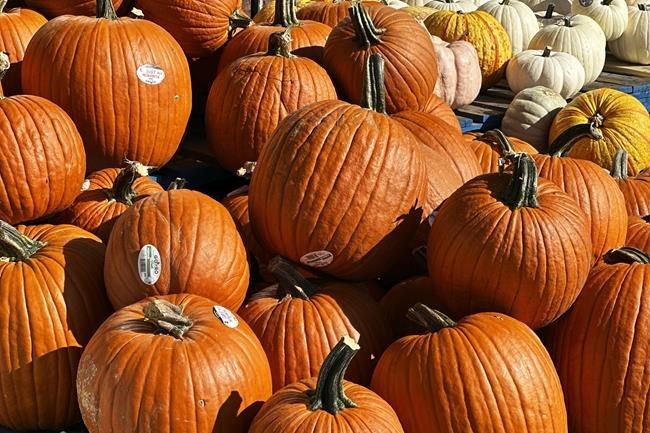FREDERICTON — Extreme weather caused by climate change — droughts followed by heavy rains — wreaked havoc with the pumpkin harvest across Canada this year.
Nova Scotia pumpkin farmer Danny Dill said the spring planting season was extremely dry. A spell of hot weather and then nearly two weeks of historic wildfires in late May and early June left behind more than 235 square kilometres of scorched ground.
"It was just like a dust bowl there," said Dill, owner of Howard Dill Enterprises, in Windsor, N.S.
But starting in June, heavy rains poured in, which made his farm resemble a waterbed and kept the bees away. When the pumpkin flowers bloomed across his patch, he said, there were fewer bees than usual to pollinate them.
"It's been a spooky, really spooky season for a lot of us."
This year's pumpkin harvest in Canada and the United States is a stark reminder of the fact farmers are at the mercy of the weather gods. Climate change led to parts of the continent baking in severe heat this summer and other areas receiving heavy rain. Both extremes were bad for crops.
Some growers in states such as Texas, New Mexico and Colorado lost 20 per cent or more of their predicted yields, while others left their land bare.
Dill said the growing season on his nearly four hectares of land was the worst he's had in 40 years of farming.
"We've gone through everything in the last five years, whether it's been droughts or hurricanes," he said. "But this year really, really took its toll on us."
Mike Williams of Ponoka, Alta., said the weather was so dry when the season began that he irrigated his farm with 12,000 litres of water every week for two months. And while this season's crop of 3,000 pumpkins was comparable to last year's, his expected revenue won't cover the cost of the water bill.
Williams, who owns Mill Tower Ranch, said farming is a "gamble."
"Farmers are the best gamblers in the world.”
Tam Andersen of Prairie Gardens, a 10-hectare farm in Sturgeon County, Alta., said she had a 50 per cent drop in her pumpkin crop this year. Her farm specializes in blue pumpkins, which have a bluish shell and meat with a sweetish, dry taste, she said.
Although her farm is north of the 56th parallel, she said she was hit with similar weather vagaries as most of the other farmers in Canada.
"We planted into ankle-deep dust on a whiff and a prayer that it would rain," Andersen said.
"Eventually it did rain but not till July and then it never stopped raining," she said. "So we got 25 inches of water in a month, which is pretty much our annual precipitation. The things on the high ground died of drought and the things in the low ground, which were doing splendidly, died drowning. The middle ground was what was left."
Farmers are used to variable weather: some seasons are good while others are bad, she said. But because of climate change, she added, a single season could have multiple extremes.
"We had our driest ever and our wettest ever back to back within two months of each other. How in the world can you plan for a crop or plan for a harvest when you have 60 days of pure drought followed by 60 days of flooding followed by 60 days when we're again in drought?"
Not all pumpkin farmers suffered this season, however. Roy Phillips, owner of the Phillips' Family Farm, in northwest London, said he's having a crop "maybe even a little bit better than normal."
"It's been weird. Back in the summertime, I didn't think that we had a good crop, but they were there. I couldn't really have wished for a better crop."
The rains came on time — although they were followed by drought, which left a few green pumpkins on the vine on his four-hectare farm that won't make it to the shops or into jack-o'-lanterns, he said.
But just because this year was good, Phillips said there's no guarantee it will be a similar result next season.
"That's the thing," he said with a laugh. "You pays your money and you takes your chances."
This report by The Canadian Press was first published Oct. 30, 2023.
— With files from The Associated Press
Hina Alam, The Canadian Press
Note to readers: This is a corrected story. A previous version misspelled Tam Andersen's last name.



